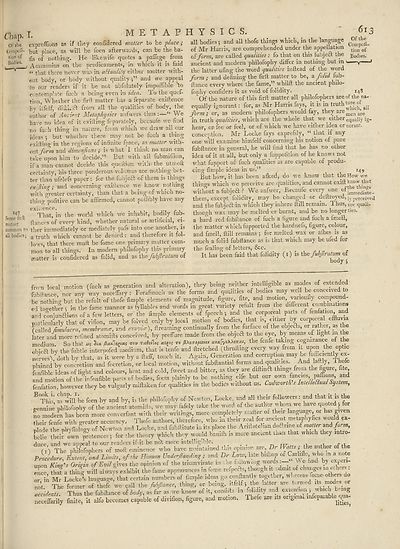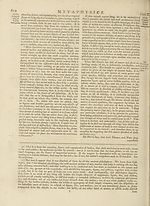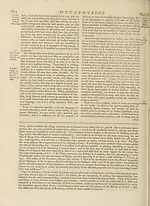Encyclopaedia Britannica, or, a Dictionary of arts, sciences, and miscellaneous literature : enlarged and improved. Illustrated with nearly six hundred engravings > Volume 13, MAT-MIC
(659) Page 613
Download files
Complete book:
Individual page:
Thumbnail gallery: Grid view | List view

Clmp.
Of the
Coin peti¬
tion of
Bodies-
I.
M E T A P
613
147
Some fir (l
matter
common to
all bodies;
expreflions as if they eonficlcred matter to be place i
but place, as will be feen afterwards, can be the ba¬
lls of nothing. He like wife quotes a paflage from
1 Ammonius on the predicaments, in which it is laid
“ that there never was in a&ttalilij either matter with¬
out body, or body without quality and we appeal
to our readers if it be not abfolutely impoffible to
contemplate fuch a being even in idea. To the quef-
tinn, Whether lire fir ft matter has a ffcparate exiftence
by itfelf. diLlL-a from all the qualities of body, the
author of Aincir-'t Metaphysics anfwers thus We
have no idea of it cxifting feparately, bccaufe we find
no fuch thing in nature, from which we draw all our
ideas •, but whether there may not be fuch a thing
exifting in the regions of infinite fpace, as matter with¬
out form and ditnenjions ; is what I think no man can
take upon him to decide.” But with all fubmifiion,
if a man cannot decide this queftion with the utmoft
certainty, his three ponderous volumes are nothing bet¬
ter than ufelefs paper : for the fubjea of them is things
cxi/iiny; and eoncerning exiftence we know nothing
with greater certainty, than that a being of which no-
thing pofitive can be affirmed, cannot poffibly have any
exiftence. _ . i-i r u
That, in the world which we inhabit, bodily iub-
llances of every kind, whether natural or artificial, ei¬
ther immediately or mediately pafs into one another, is
a truth which cannot be denied: and therefore it fol¬
lows, that there mult be fome one primary matter com-
mon'to all things. In modern philofophy this primary
matter is conlidered as folid, and as \\vt fubjlratum of
Of the
Competi¬
tion of
Bodies.
14S
H Y S I C S.
all bodies-, and all thofe things which, in the language
of Mr Harris, are comprehended under the appellation
of form, are called qualities: fo that on this iubject the
ancient and modern philofophy differ in notiiing but in
the latter ufing the word qualities inllead of the word
form ; and defining the firft matter to be, a folid fub-
ftance every where the fame,” whilft the ancient philo-
fophy confiders it as void of folidity.
Of the nature of this firft matter all philofophers are of the na-
equally ignorant: for, as Mr Harris fays, it is in truth ^eo ^
firm ; or, as modern philofophers would fay, they aremena’re
in truth qualities, which are the whole that we either equaBy ig-
hear, or fee or feel, or of which we have eifher idea ornorant.
conception. Mr Locke fays exprefsly, “ that if any¬
one will examine himfelf concerning his notion of pure
fubftance in general, lie will find that he has no other
idea of it at all, but only a fuppoiition of he knows not
what fupport of fuch qualities as are capable of produ¬
cing fimple ideas in us.'5 149
But how, it has been a (Iced, do we know that the How we
things which we perceive arc qualities, and cannot exift know that
without a-fubjeft ? We anfwer, Becaufe every one of
them, except folidity, may be- changed or deftroyed,ly perceived
and the fubjecHn which they inhere ftill remain. Thus, are quali-
though wax may be melted or burnt, and be no longer ties,
a hard red fubftance of fuch a figure and fuch a fmell,
the matter which fupported the hardnefs, figure, colour,
and fmell, ftill remains j for melted wax or affies is as
much a folid fubftance as is that which may be ufed for
the fealing of letters, &e.
It has been laid that folidity (1) is the fubfratum of
body;
from local motion (fuch as generation and alteration), they being neither intelligible as modes of extended
fubftance nor any way neceffary : Forafmuch as the forms and qualities of bodies may well be conceived tc
be nothing but the refult of thofe fimple elements of magnitude, figure, fite and motion vanoufly compound¬
ed together in the fame manner as fyllables and words in great variety reiult from the different combinations
and eoniunftions of a few letters, or the fimple elements of fpeech; and the corporeal parts of fenfation, and
mrticularlv that of vifion, may be folved only by local motion of bodies, that is, either .by corporeal effluvia
(called Jimilacra, membranes, and exuvia-), ftreaming continually from the fur face of the objects, or ratber, as the
later and more refined atomifts conceived, by preffure made from the objeft to the eye, by means of ligb in i
medium. So that r.v rahMs r9 /2te;rcpm> xvxfyilterxi, the fenfe taking cognizance of the
objeft by the fubtle interpofed medium, that is tenfe and ftretched (thruftmg every way from n upon the optic
nervesl doth bv that, as it were by a ftaff, touch it. Again, Generation and corruption may be fufficiently^ex-
plaTnedbv concretion and fecretion, or local motion, without fubftantial forms and qualities. And la ft ly, Thofe
fenfible ideas of light and colours, heat and cold, fweet and bitter, as they are diftinfl things flora the ngure, fite
and motion of the^nfenfible parts of bodies, feera plainly to be nothing elfe but our own fancies paffions, and
fenfation, however they be vulgarly miftaken for qualities in the bodies without us. Cudworth s Intellediual System,
E TV,'; ^ will'k feen bv and by, is the pbilofepby of Newton, Locke, and all their followers : and that it is the
Aft; philofophy of the' ancient atomitb, we may fafely take the word of the author whom we have quoted ; for
no modem has been more converfant with their writings, more completely mailer 01 their language, or has given
their fenfe with greater accuracy. Thofe authors, therefore, who m their zeal for ancient metap ly c
plode the nhyfiology of Newton and Locke, and fubllitute in its place the Arliloteban doc rine of matter and /<v »!,
belie their own pretences; for the theory which they would bauiih i, more ancient than that which they intro-
duce and we appeal to our readers it it be not mo;e inte!tigm,e. ... TT7- .-i ,1 p .1
(1) The phikffophers of moft eminence who have maintained tins opinion are,Z)r JVatts - the author of
Procedure, Extent, Ind Limits, of the Human Under/landing; and Dr Law, late bifflop or Carlffie who m a note
upon King's Origin of Evil gives the opinion of the triumvirate m t he following words -A e and by exper -
encc that a thing will always exhibit the fame appearances in fome refpeas, though it admit of changes m o., cn .
or Mr Locked language, that certain numbers of fimple ideas go conftant v together, whereasTome others do
no’t The former of thefe we call the fubfance, thing, or being,, itfelfthe latter are termed its modes or
accidents. Thus the fubftance of body, as far as we know of it, conufts m folidity and exiennonj which ■ mg
neceffarily finite, it alfo becomes capable of divifion, figure, and motion. Ihefe axe its original mfepax able qua
Of the
Coin peti¬
tion of
Bodies-
I.
M E T A P
613
147
Some fir (l
matter
common to
all bodies;
expreflions as if they eonficlcred matter to be place i
but place, as will be feen afterwards, can be the ba¬
lls of nothing. He like wife quotes a paflage from
1 Ammonius on the predicaments, in which it is laid
“ that there never was in a&ttalilij either matter with¬
out body, or body without quality and we appeal
to our readers if it be not abfolutely impoffible to
contemplate fuch a being even in idea. To the quef-
tinn, Whether lire fir ft matter has a ffcparate exiftence
by itfelf. diLlL-a from all the qualities of body, the
author of Aincir-'t Metaphysics anfwers thus We
have no idea of it cxifting feparately, bccaufe we find
no fuch thing in nature, from which we draw all our
ideas •, but whether there may not be fuch a thing
exifting in the regions of infinite fpace, as matter with¬
out form and ditnenjions ; is what I think no man can
take upon him to decide.” But with all fubmifiion,
if a man cannot decide this queftion with the utmoft
certainty, his three ponderous volumes are nothing bet¬
ter than ufelefs paper : for the fubjea of them is things
cxi/iiny; and eoncerning exiftence we know nothing
with greater certainty, than that a being of which no-
thing pofitive can be affirmed, cannot poffibly have any
exiftence. _ . i-i r u
That, in the world which we inhabit, bodily iub-
llances of every kind, whether natural or artificial, ei¬
ther immediately or mediately pafs into one another, is
a truth which cannot be denied: and therefore it fol¬
lows, that there mult be fome one primary matter com-
mon'to all things. In modern philofophy this primary
matter is conlidered as folid, and as \\vt fubjlratum of
Of the
Competi¬
tion of
Bodies.
14S
H Y S I C S.
all bodies-, and all thofe things which, in the language
of Mr Harris, are comprehended under the appellation
of form, are called qualities: fo that on this iubject the
ancient and modern philofophy differ in notiiing but in
the latter ufing the word qualities inllead of the word
form ; and defining the firft matter to be, a folid fub-
ftance every where the fame,” whilft the ancient philo-
fophy confiders it as void of folidity.
Of the nature of this firft matter all philofophers are of the na-
equally ignorant: for, as Mr Harris fays, it is in truth ^eo ^
firm ; or, as modern philofophers would fay, they aremena’re
in truth qualities, which are the whole that we either equaBy ig-
hear, or fee or feel, or of which we have eifher idea ornorant.
conception. Mr Locke fays exprefsly, “ that if any¬
one will examine himfelf concerning his notion of pure
fubftance in general, lie will find that he has no other
idea of it at all, but only a fuppoiition of he knows not
what fupport of fuch qualities as are capable of produ¬
cing fimple ideas in us.'5 149
But how, it has been a (Iced, do we know that the How we
things which we perceive arc qualities, and cannot exift know that
without a-fubjeft ? We anfwer, Becaufe every one of
them, except folidity, may be- changed or deftroyed,ly perceived
and the fubjecHn which they inhere ftill remain. Thus, are quali-
though wax may be melted or burnt, and be no longer ties,
a hard red fubftance of fuch a figure and fuch a fmell,
the matter which fupported the hardnefs, figure, colour,
and fmell, ftill remains j for melted wax or affies is as
much a folid fubftance as is that which may be ufed for
the fealing of letters, &e.
It has been laid that folidity (1) is the fubfratum of
body;
from local motion (fuch as generation and alteration), they being neither intelligible as modes of extended
fubftance nor any way neceffary : Forafmuch as the forms and qualities of bodies may well be conceived tc
be nothing but the refult of thofe fimple elements of magnitude, figure, fite and motion vanoufly compound¬
ed together in the fame manner as fyllables and words in great variety reiult from the different combinations
and eoniunftions of a few letters, or the fimple elements of fpeech; and the corporeal parts of fenfation, and
mrticularlv that of vifion, may be folved only by local motion of bodies, that is, either .by corporeal effluvia
(called Jimilacra, membranes, and exuvia-), ftreaming continually from the fur face of the objects, or ratber, as the
later and more refined atomifts conceived, by preffure made from the objeft to the eye, by means of ligb in i
medium. So that r.v rahMs r9 /2te;rcpm> xvxfyilterxi, the fenfe taking cognizance of the
objeft by the fubtle interpofed medium, that is tenfe and ftretched (thruftmg every way from n upon the optic
nervesl doth bv that, as it were by a ftaff, touch it. Again, Generation and corruption may be fufficiently^ex-
plaTnedbv concretion and fecretion, or local motion, without fubftantial forms and qualities. And la ft ly, Thofe
fenfible ideas of light and colours, heat and cold, fweet and bitter, as they are diftinfl things flora the ngure, fite
and motion of the^nfenfible parts of bodies, feera plainly to be nothing elfe but our own fancies paffions, and
fenfation, however they be vulgarly miftaken for qualities in the bodies without us. Cudworth s Intellediual System,
E TV,'; ^ will'k feen bv and by, is the pbilofepby of Newton, Locke, and all their followers : and that it is the
Aft; philofophy of the' ancient atomitb, we may fafely take the word of the author whom we have quoted ; for
no modem has been more converfant with their writings, more completely mailer 01 their language, or has given
their fenfe with greater accuracy. Thofe authors, therefore, who m their zeal for ancient metap ly c
plode the nhyfiology of Newton and Locke, and fubllitute in its place the Arliloteban doc rine of matter and /<v »!,
belie their own pretences; for the theory which they would bauiih i, more ancient than that which they intro-
duce and we appeal to our readers it it be not mo;e inte!tigm,e. ... TT7- .-i ,1 p .1
(1) The phikffophers of moft eminence who have maintained tins opinion are,Z)r JVatts - the author of
Procedure, Extent, Ind Limits, of the Human Under/landing; and Dr Law, late bifflop or Carlffie who m a note
upon King's Origin of Evil gives the opinion of the triumvirate m t he following words -A e and by exper -
encc that a thing will always exhibit the fame appearances in fome refpeas, though it admit of changes m o., cn .
or Mr Locked language, that certain numbers of fimple ideas go conftant v together, whereasTome others do
no’t The former of thefe we call the fubfance, thing, or being,, itfelfthe latter are termed its modes or
accidents. Thus the fubftance of body, as far as we know of it, conufts m folidity and exiennonj which ■ mg
neceffarily finite, it alfo becomes capable of divifion, figure, and motion. Ihefe axe its original mfepax able qua
Set display mode to:
![]() Universal Viewer |
Universal Viewer | ![]() Mirador |
Large image | Transcription
Mirador |
Large image | Transcription
Images and transcriptions on this page, including medium image downloads, may be used under the Creative Commons Attribution 4.0 International Licence unless otherwise stated. ![]()
| Permanent URL | https://digital.nls.uk/192692612 |
|---|
| Attribution and copyright: |
|
|---|
| Description | Ten editions of 'Encyclopaedia Britannica', issued from 1768-1903, in 231 volumes. Originally issued in 100 weekly parts (3 volumes) between 1768 and 1771 by publishers: Colin Macfarquhar and Andrew Bell (Edinburgh); editor: William Smellie: engraver: Andrew Bell. Expanded editions in the 19th century featured more volumes and contributions from leading experts in their fields. Managed and published in Edinburgh up to the 9th edition (25 volumes, from 1875-1889); the 10th edition (1902-1903) re-issued the 9th edition, with 11 supplementary volumes. |
|---|---|
| Additional NLS resources: |
|

